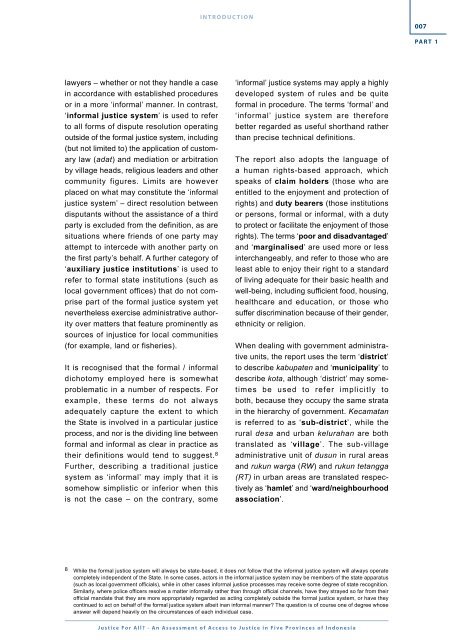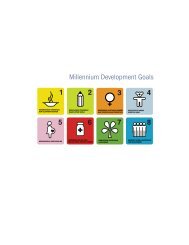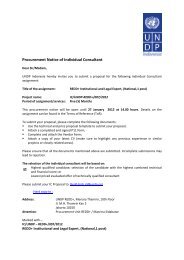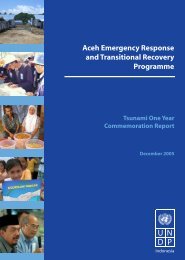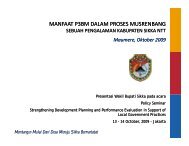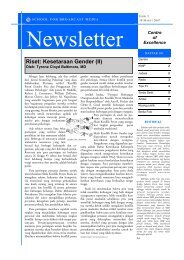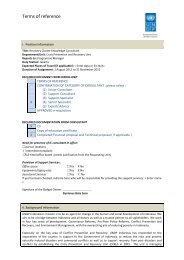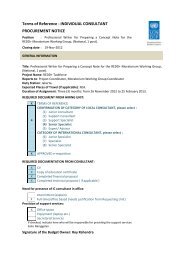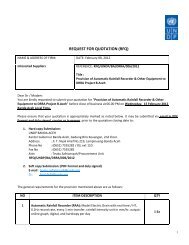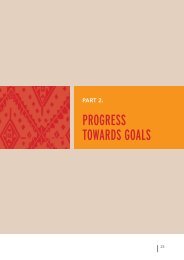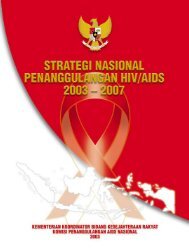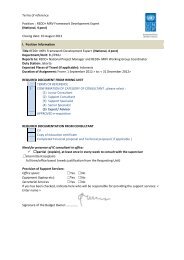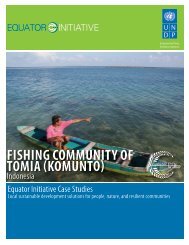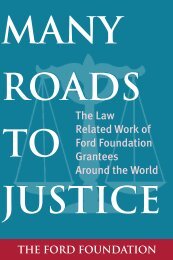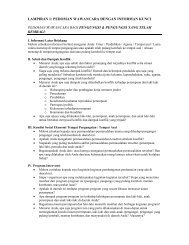Justice For All? - UNDP
Justice For All? - UNDP
Justice For All? - UNDP
Create successful ePaper yourself
Turn your PDF publications into a flip-book with our unique Google optimized e-Paper software.
INTRODUCTION<br />
007<br />
PART 1<br />
lawyers – whether or not they handle a case<br />
in accordance with established procedures<br />
or in a more ‘informal’ manner. In contrast,<br />
‘informal justice system’ is used to refer<br />
to all forms of dispute resolution operating<br />
outside of the formal justice system, including<br />
(but not limited to) the application of customary<br />
law (adat) and mediation or arbitration<br />
by village heads, religious leaders and other<br />
community figures. Limits are however<br />
placed on what may constitute the ‘informal<br />
justice system’ – direct resolution between<br />
disputants without the assistance of a third<br />
party is excluded from the definition, as are<br />
situations where friends of one party may<br />
attempt to intercede with another party on<br />
the first party’s behalf. A further category of<br />
‘auxiliary justice institutions’ is used to<br />
refer to formal state institutions (such as<br />
local government offices) that do not comprise<br />
part of the formal justice system yet<br />
nevertheless exercise administrative authority<br />
over matters that feature prominently as<br />
sources of injustice for local communities<br />
(for example, land or fisheries).<br />
It is recognised that the formal / informal<br />
dichotomy employed here is somewhat<br />
problematic in a number of respects. <strong>For</strong><br />
example, these terms do not always<br />
adequately capture the extent to which<br />
the State is involved in a particular justice<br />
process, and nor is the dividing line between<br />
formal and informal as clear in practice as<br />
their definitions would tend to suggest. 8<br />
Further, describing a traditional justice<br />
system as ‘informal’ may imply that it is<br />
somehow simplistic or inferior when this<br />
is not the case – on the contrary, some<br />
‘informal’ justice systems may apply a highly<br />
developed system of rules and be quite<br />
formal in procedure. The terms ‘formal’ and<br />
‘informal’ justice system are therefore<br />
better regarded as useful shorthand rather<br />
than precise technical definitions.<br />
The report also adopts the language of<br />
a human rights-based approach, which<br />
speaks of claim holders (those who are<br />
entitled to the enjoyment and protection of<br />
rights) and duty bearers (those institutions<br />
or persons, formal or informal, with a duty<br />
to protect or facilitate the enjoyment of those<br />
rights). The terms ‘poor and disadvantaged’<br />
and ‘marginalised’ are used more or less<br />
interchangeably, and refer to those who are<br />
least able to enjoy their right to a standard<br />
of living adequate for their basic health and<br />
well-being, including sufficient food, housing,<br />
healthcare and education, or those who<br />
suffer discrimination because of their gender,<br />
ethnicity or religion.<br />
When dealing with government administrative<br />
units, the report uses the term ‘district’<br />
to describe kabupaten and ‘municipality’ to<br />
describe kota, although ‘district’ may sometimes<br />
be used to refer implicitly to<br />
both, because they occupy the same strata<br />
in the hierarchy of government. Kecamatan<br />
is referred to as ‘sub-district’, while the<br />
rural desa and urban kelurahan are both<br />
translated as ‘village’. The sub-village<br />
administrative unit of dusun in rural areas<br />
and rukun warga (RW) and rukun tetangga<br />
(RT) in urban areas are translated respectively<br />
as ‘hamlet’ and ‘ward/neighbourhood<br />
association’.<br />
8 While the formal justice system will always be state-based, it does not follow that the informal justice system will always operate<br />
completely independent of the State. In some cases, actors in the informal justice system may be members of the state apparatus<br />
(such as local government officials), while in other cases informal justice processes may receive some degree of state recognition.<br />
Similarly, where police officers resolve a matter informally rather than through official channels, have they strayed so far from their<br />
official mandate that they are more appropriately regarded as acting completely outside the formal justice system, or have they<br />
continued to act on behalf of the formal justice system albeit inan informal manner? The question is of course one of degree whose<br />
answer will depend heavily on the circumstances of each individual case.<br />
<strong>Justice</strong> <strong>For</strong> <strong>All</strong>? - An Assessment of Access to <strong>Justice</strong> in Five Provinces of Indonesia


